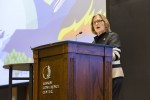The image of the rust-colored robot, Wall-E, sitting on a pile of trash, was projected onto a large screen as a speaker addressed her audience.
The world in 2050 will likely resemble the Pixar movie, she told them.
“I don’t believe our future is predestined,” said Katherine Sullivan, administrator of the National Oceanic and Atmospheric Administration. “A dystopian future is not inevitable. There are things we can do better.”
Sullivan’s presentation initiated the first UCLA College Luskin Endowment Symposium on Tuesday, titled “Earth Now: Earth 2050.” The Meyer and Renee Luskin Conference Center plans to host the three-day long symposium yearly to spark conversation about world issues.
Sullivan said NOAA projects average global temperatures to rise by 2.7 degrees Celsius and expects the city of Los Angeles to experience at least one major flooding event by 2050.
Other speakers at the event focused on mitigating greenhouse gas emissions, adapting to the changing environment and using data to fight climate change.
On Wednesday, Jim Williams, director of the Deep Decarbonization Pathways Project, continued the discussion of climate change’s place in politics in a panel, titled “U.S. Climate Regulation: Beyond First Steps.”
In a conversation with David Roberts, a Vox energy and climate change writer, and Rep. Ted Lieu (D-Torrance), Williams said he thinks most political policies temporarily fix climate problems and do not extend far enough in the future.
“Most people concerned with the state of our planet haven’t been looking past the year 2020,” Williams said. “We need to change the climate policy conversation from temporary to long-term.”
Speakers also discussed the importance of electing new political leaders. Roberts said he thinks climate change has unfortunately become a partisan issue.
“When right-wing leaders drop the issue of climate change, their party also begins to forget about it,” Roberts said. “This shapes the political economy of climate in the U.S., because the Republican party controls about 70 percent of state legislators.”
Roberts said he thinks people should elect more Democrats because the Republican party largely ignores climate change.
Lieu disagreed and said he said he thinks more Republicans will support climate change laws as data continues to prove its severity.
Attendees said they went to the symposium to learn about different environmental causes.
Nisha Bansal, a first-year environmental science student said she attended because she wanted to learn about mitigating humans’ impact on oceans.
“Protecting our oceans and our coral reefs is something that is really important to me,” Bansal said. “(Sullivan) said that, ‘Every other breath you take comes from the ocean,’ which I think sums up really well why we need to protect our oceans.”
Gary Lewis, a UCLA Anderson School of Management alumnus, attended the conference to hear political leaders’ opinions about how technology can lower carbon dioxide emissions.
“I don’t have conversations like this everyday,” Lewis said. “I only have them when I come to a place where there are a lot of like-minded people with same goals.”
Lewis said he thinks these conversations will be crucial in preventing destruction to Earth in the long run.
Contributing reports from Isabella Welch, Daily Bruin contributor.
